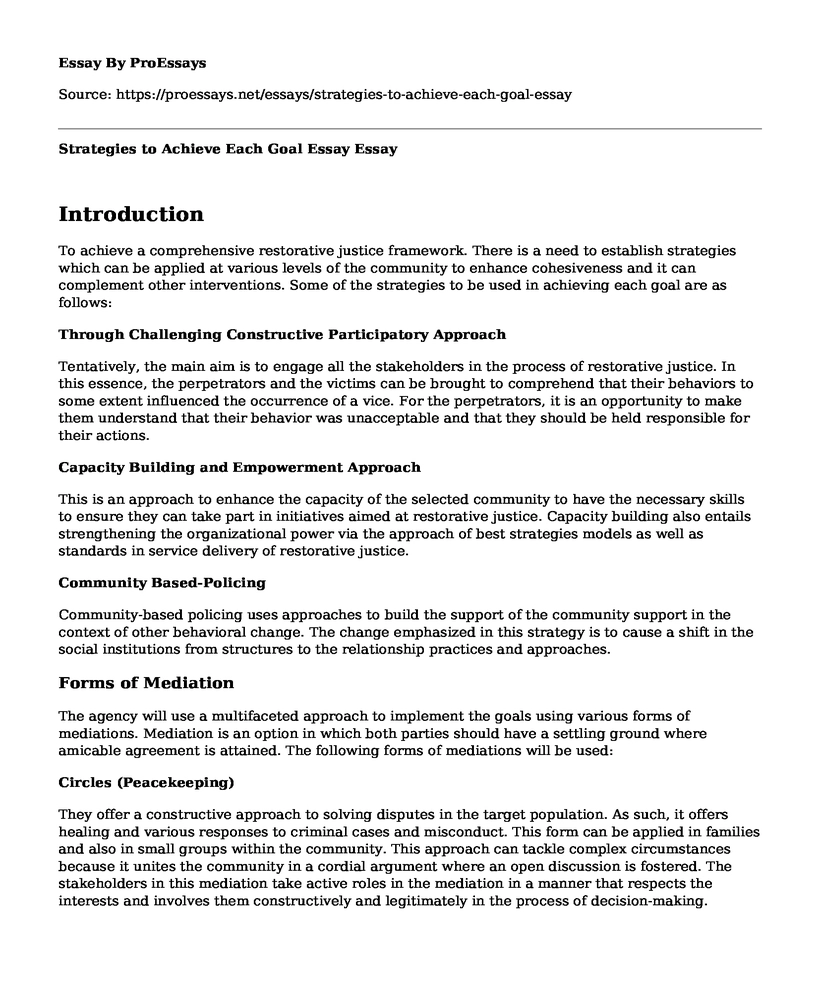Introduction
To achieve a comprehensive restorative justice framework. There is a need to establish strategies which can be applied at various levels of the community to enhance cohesiveness and it can complement other interventions. Some of the strategies to be used in achieving each goal are as follows:
Through Challenging Constructive Participatory Approach
Tentatively, the main aim is to engage all the stakeholders in the process of restorative justice. In this essence, the perpetrators and the victims can be brought to comprehend that their behaviors to some extent influenced the occurrence of a vice. For the perpetrators, it is an opportunity to make them understand that their behavior was unacceptable and that they should be held responsible for their actions.
Capacity Building and Empowerment Approach
This is an approach to enhance the capacity of the selected community to have the necessary skills to ensure they can take part in initiatives aimed at restorative justice. Capacity building also entails strengthening the organizational power via the approach of best strategies models as well as standards in service delivery of restorative justice.
Community Based-Policing
Community-based policing uses approaches to build the support of the community support in the context of other behavioral change. The change emphasized in this strategy is to cause a shift in the social institutions from structures to the relationship practices and approaches.
Forms of Mediation
The agency will use a multifaceted approach to implement the goals using various forms of mediations. Mediation is an option in which both parties should have a settling ground where amicable agreement is attained. The following forms of mediations will be used:
Circles (Peacekeeping)
They offer a constructive approach to solving disputes in the target population. As such, it offers healing and various responses to criminal cases and misconduct. This form can be applied in families and also in small groups within the community. This approach can tackle complex circumstances because it unites the community in a cordial argument where an open discussion is fostered. The stakeholders in this mediation take active roles in the mediation in a manner that respects the interests and involves them constructively and legitimately in the process of decision-making.
Family Group Conferencing
This form of mediation brings onboard a bigger number of individuals which entails those who are affected by the crime committed. The friends, family, the victim and the perpetrator come in a discussion where a trained individual facilitates the process. In its deliberation, the perpetrator has to plead guilty to the ill deeds. However, participation is on a voluntary basis. In this conference, the facilitator uses approaches through which both the offender and victim can repair the damage caused. This procedure is entirely guided by the facilitator who explains the predetermined procedure of the conference. The two are instructed to identify their family members and friends who would be helpful in the conference.
Victim Offender Mediation
This form where a face-to-face meeting is conducted to enhance the authenticity of information in the presence of victim and the perpetrator of the crime. This victim-offender reconciliation method uses the skills of a trained personnel to establish an agreement. In many cases, a mutual comprehensive plan to solve the problem is formulated. This is a tailor-made approach that enhances the process of decision-making.
Mediation Specific to the Group
The mediation specific to the group is the multi-method approach. It entails the particular population affected by the crime coming into a substantive direct dialogue in which discussion deliberates on the implications of the crime, to address any further concerns as well as establish a workable plan of repairing the damage it causes in totality. In this respect, to attain the goals, the victim-offender conferencing or dialogue would apply. Traditionally, this method has been widely used in many justice practices fostered at mediation. The fundamental aspects of this approach are to involve all the people directly affected, the victim and the offender have the autonomy to select those who would participate, design the process to fit to the needs of stakeholders, treating both respectfully but offering much help to the victim, as well as a thorough preparation by all stakeholders before the joint dialogue conference.
Three Strategies to Develop Restorative Justice
The agency will establish channels through which key stakeholders can be involved in funding and secure more resources that may be used to develop the capacity of the community through empowerment.
The agency will enhance the opportunities through which the delivery of the interventions. Moreover, it would be imperative in ensuring it makes the community effective and builds statutory framework.
The agency will create a framework where research is promoted to acknowledge and apply the interventions in various jurisdictions relevant to this course. It will emphasize a proactive approach and flexibility to the interventions of restorative justice in light with effective practices. It would, however, acknowledge that legislation may not necessarily be productive in offering restorative justice.
Cite this page
Strategies to Achieve Each Goal Essay. (2022, Apr 04). Retrieved from https://proessays.net/essays/strategies-to-achieve-each-goal-essay
If you are the original author of this essay and no longer wish to have it published on the ProEssays website, please click below to request its removal:
- Young People are Free From Responsibilities Essay
- Advantages and Disadvantages of Couchsurfing Paper Example
- Women in Movies Essay Example
- Essay on Conflict Resolution: Understanding Human Nature for Positive Outcomes
- Pereboom's Libertarian Account for Human Choices: Bridging the Gap - Essay Sample
- Essay Sample on In the Looking Glass: The Impact of the Internet on Society
- The Power of Coalitions - Free Essay Sample







